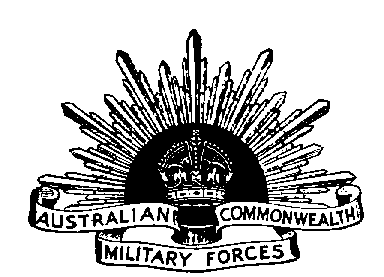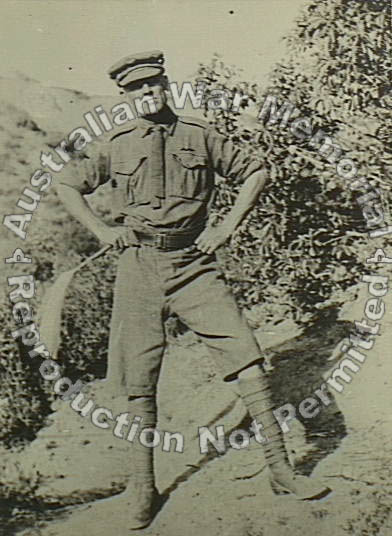


AWM Negative Number: G01330 Caption: Sep 1915; Gallipoli Peninsula, Turkey. September 1915. Colonel J. M. Antill of 3rd Australian Light Horse, on Rhodendron Spur. Photographer:
Bean, Charles Edwin Woodrow
John MacQuarie Antill was born at Jarvisfield, Picton, New South Wales on 26 January 1866, the second surviving son of John MacQuarie Antill. His grandfather, Major Henry Colden Antill, had served in America and India before coming to New South Wales, where he served as aide de camp to Governor MacQuarie. Young Jack Antill was educated at Sydney Grammar where he served in the school cadet unit, and became a surveyor.
Antill joined the local militia in 1887. In 1889, he raised a squadron of mounted infantry in Picton, of which he was given command. The Picton squadron became part of the New South Wales Mounted Rifles (as it became known in 1890), in which Antill was commissioned as a captain on 19 January 1889. Antill came to the attention of Major General Edward Hutton, the commander of the New South Wales Military Forces. Hutton arranged for Antill to do a tour of duty with the British army in India in 1893, serving with the 1st Battalion, Devonshire Regiment and the 2nd Dragoon Guards. On his return to Australia in 1894, Antill was commissioned into the state's permanent forces as a captain.
In November 1899, Antill was promoted to major and given command of 'A' Squadron of the New South Wales Mounted Rifles, a unit specially raised for service in the Boer War. Arriving in Cape Town on 6 December 1899, the squadron participated in the cavalry sweep to relieve Kimberley that began on 13 February 1900 and the last major battle of the war, the Battle of Paardeberg on 18 February 1900. The squadron was present at Osfontein, the entry into Bloemfontein, and the capture of Pretoria, and was involved in operations Transvaal and Orange River Colony.
Antill returned to Australia on 8 January 1901, but was back in South Africa in March as second in command of the 2nd New South Wales Mounted Rifles, taking part in the capture of Potgier's convoy on the River Vaal in May. In eastern Transvaal, Antill was involved in a series of night marches that resulted in the capture of over 1,000 prisoners. Antill was twice mentioned in dispatches, was appointed a Companion of the Bath (CB) in 1900 and was made a brevet lieutenant colonel, returning to Australia a war hero.
From 1904 to 1906, Antill emulated his grandfather by becoming aide de camp to the Governor General, Lord Northcote. After this he retired from the army and returned to Picton.
Antill returned to the Army in 1911as Commandant of the Instructional Staff Schools. Widely known as "Bull" Antill, or simply "Bullant", he had a reputation as a tough, square jawed disciplinarian. Antill's devastating assessment of conditions at Liverpool Camp in 1913 caused a storm of indignation and a court of inquiry found Antill harsh and tactless, his allegations unfair and unjust, but no action was taken against Antill.
On 17 October 1914, Antill was appointed to the AIF as brigade major of the 3rd Light Horse Brigade, it being the custom to pair militia brigade commanders, in this case Colonel F. G. Hughes, with an experienced regular brigade major. Antill embarked for Egypt on 25 February 1915. In May, it moved to Anzac for dismounted action, taking over the section of the line on Walker's Ridge and Russell's Top from the New Zealanders. There the 3rd Light Horse Brigade was ordered to make an attack on the Nek on 7 August 1915.
The capture of Chunuk Bair to the rear of the position by the New Zealanders and the German Officers' Trench which enfiladed it, by the 6th Battalion under Lieutenant Colonel H. G. Bennett, had been regarded as the precondition for the attack, but neither had been accomplished by the morning on which the attack was scheduled. Thus the attack on the Nek, intended as a turning movement, instead became a frontal assault. The bombardment of the Turkish trenches lifted at what appeared to be several minutes early to the light horsemen due to their watches not being properly synchronised with that of the artillery, giving the Turks ample time to set up their machine guns. The first wave of 150 men, half of the Victorian 8th Light Horse Regiment, went over the parapet led by its commander, Lieutenant Colonel A. H. White, who had shaken Antill's hand and said goodbye to him ten minutes before. A fusillade of rifle and machine gun fire cut down most of them, although some reached the enemy's trenches. The second wave followed, with the same result.
Then the third wave, half of the 10th Light Horse Regiment from Western Australia, took its place on the fire steps. Its commander, Lieutenant Colonel N. M. Brazier, tried to persuade Antill, who was forced to remain at brigade headquarters owing to Hughes having gone forward, to call off the attack. But Antill had little confidence in Brazier, who was widely regarded as incompetent. Thus Lieutenant Colonel A. H. White's courageous by foolhardy decision was doubly tragic, for had he added his protest to Brazier's, Antill might have called off the attack. Under orders to attack, knowing that some men had reached the Turkish trenches, and mistakenly believing Hughes to be forward controlling the brigade, Antill refused. The third wave then went to their deaths. By this time Hughes had ordered the attack discontinued; but due to a tragic confusion of orders, the fourth line also charged. Of a total of about 300 men who made the charge in the 8th Light Horse, 154 were killed and 80 wounded. In the 10th Light Horse, 80 were killed and 58 wounded.
Antill took over acting command of the 3rd Light Horse Brigade on 20 September 1915 when Hughes was evacuated sick. He remained with the brigade until the end of the campaign, but it never took part in another major action.
On 1 January 1916, Antill was promoted to colonel and temporary brigadier general and confirmed in command. For some reason, Antill was highly rated by the British staff at EEF GHQ and for this reason, when three double squadrons were formed at Tel El Kebir on 23 May 1916, they were attached to the 3rd Light Horse Brigade for training purposes.
The 3rd Light Horse Brigade took over part of the defence of No. 2 Section of the Suez Canal defences. Only in August was the brigade released to join the Anzac Mounted Division at Romani, too late to be decisive, and nearly too late to join the battle at all.
At Bir el Abd on 5 August 1916, Antill began well enough by piercing the Turkish flank and overrunning the Turkish position at Hamisah, taking 425 prisoners. But as his regiments reformed after the engagement, they came under light shell fire, and Antill decided to fall back. He appeared to have lost his nerve, perhaps still haunted by the events at the Nek. The decision cost Major General H. G. Chauvel vital hours, and removed the 3rd Light Horse Brigade from the battle.
Shortly afterwards a cable was received from Lieutenant General W. R. Birdwood, requesting Antill's services as a spare infantry brigade commander in France. Antill elected to go and handed over command of his brigade on 9 August 1916. He didn't have long to wait for a brigade, taking charge of the 2nd Infantry Brigade on 18 September 1916. He was evacuated sick to England in November 1916.
Antill took command of the 16th Infantry Brigade on 20 March 1917. This formation was part of the 6th Division, which was then forming on the Salisbury Plain in England. Despite efforts, Antill was unable to get the medical authorities to certify him fit for active service again. Flunking his final medical examination, he relinquished command of the brigade on 20 September 1917 and returned to Australia, where his AIF appointment was terminated in December 1917. He was awarded a Companion of St Michael and St George (CMG) and mentioned in dispatches.
In 1918, Antill became Assistant Adjutant General. Later that year he became Commandant of the 5th Military District (South Australia). From 1921 to 1922 he was Chief Instructor at the Training Depot in Liverpool, NSW. He retired again on 26 January 1924 with the honorary rank of major general.
In retirement, he co-authored a play about the life of William Redfern with his daughter, Rose Antill de Warren, called The Emancipist, which was published in 1936. He finally lost a three year battle against cancer on 1 March 1937.
Brusque of manner and speech, Antill was a courageous soldier, an able leader and above all a stern disciplinarian. Many British officers considered him the very model of what a soldier should be. But in Australia he never escaped his role in those terrible hours at the Nek that became a byword for senseless self-sacrifice and probably never will.
Sources: Australian Dictionary of Biography, 1899-1939, Vol 7, pp. 81-82; Burness, Peter, The Nek, pp. 33-42; Bean, C. E. W., The Official History of Australia in the War of 1914-1918, Volume II: The Story of Anzac, pp. 606-633; Gullett, H. S., Volume VII: The Australian Imperial Force in Sinai and Palestine, pp. 116, 169, 184. AWM File 4, War Diary of 16th Infantry Brigade.
Page created by Ross
Mallett
ross@metva.com.au
Last update 8 June 2010